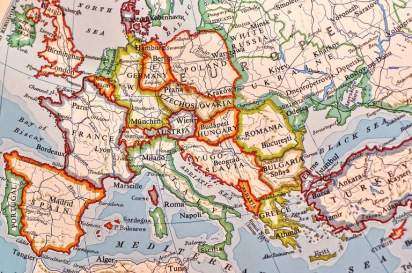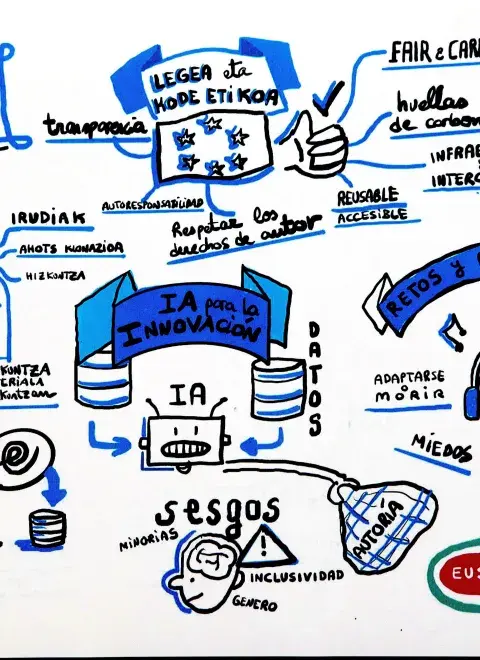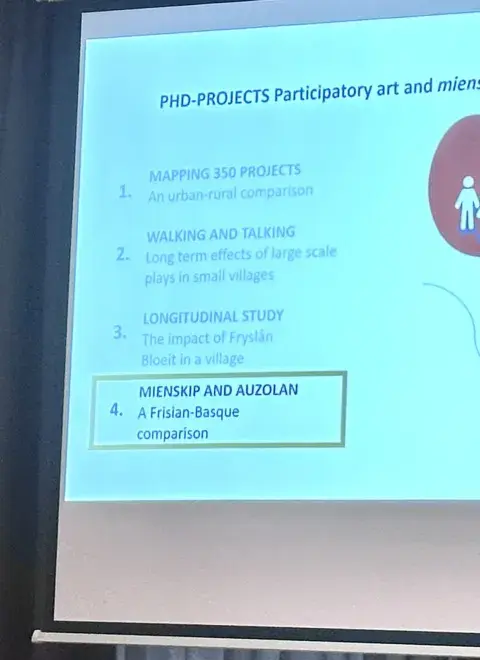
- Blog
Multilingual and multicultural university-work environment: focus on New Aquitaine and the Basque Country
Picture. Banyan Tree, a symbol often used to describe the multilingual individual as in Ophelia Garcia's Bilingual education in the 21st century: A global perspective (2009)
Why focus on a multilingual and multicultural university-work environment: New Aquitaine and the Basque Country[1]
Bearing in mind the scope of the recent congress Languages, Heritage and Identity. An Educational Perspective, celebrated at Donostia-San Sebastián, in November 2018 organised by the UPV/EHU in collaboration with the University of Bordeaux, and the relevant issues to be tackled such as :
- To bring the university students of the axis Aquitaine-Euskadi-Navarra into contact and to intensify the scientific and educational relations already in progress.
- To analyse the role of languages, specifically Euskara, in the multilingual panorama in the educational field.
- To analyse the use of different languages and their relationship with the construction of identity.
- To analyse the role of language as a means of social and university integration in multi-lingual educational contexts.(2)
It seemed relevant to offer a snapshot view of the research study carried out last academic year within the framework of EMME, European Master on Multilingualism and Education, at UPV/EHU (3). The results of this work are coherently aligned with the objectives of the mentioned congress and also revolve around the main topics:
- Languages: Relationship between Education and Languages
- Languages in the construction of identities
We tried to discuss the multilingual community of Euskampus-Bordeaux cross-borders university campus and to investigate the multicultural and multilingual environment of this community formed by students, professors, researchers and management staff and other professionals from university related entities. We studied the languages that are at play when interacting during the development of different projects, more precisely within the framework of Euskampus Bordeaux Campus, the cross-borders university campus of the University of Bordeaux and the University of the Basque Country UPV/EHU. The language use, the language choice and the relevance of a language policy for this community are issues taken into consideration in the present study. The ultimate goal is to build a greater language awareness in the community, as well as to stimulate participants to provide opportunities of use for all the languages that co-exist in this common ground of New Aquitaine-Basque Country. In other words, «reinforcer les relations culturelles et linguistiques entre les regions ». That is to say, strengthen the cultural and linguistic relations between the regions. This is why the present study focuses on the linguistic scenario of this community, and deals with the current practices of multilingualism, reflecting also on best practices and suggesting recommendations for the future.
Euskampus Fundazioa is facing an ever changing and enlarging multi-cultural, multilingual community. In 2017 it integrated the University of Bordeaux in the Board of Trustees of the Foundation. The current team that manages the project is a clear example of a group of multilingual employees who have to deal every day with a multicultural and multilingual environment, sometimes locally, sometimes internationally. The networks created to boost collaboration keep enlarging nationally and internationally.

These activities of creating new networks are also aligned with the idea about a European University, expressed by President Macron in his speech about re-founding Europe, on September 26th 2017 at the University of Sorbonne, Paris where he mentioned:
« Je propose la création d’universités européennes qui seront un réseau d’universités de plusieurs pays d’Europe, mettant en place un parcours où chacun de leurs étudiants étudiera à l’étranger et suivra des cours dans deux langues au moins. Des universités européennes qui seront aussi des lieux d’innovation pédagogique, de recherche d’excellence. Nous devons nous fixer, d’ici à 2024, en construire au moins une vingtaine. Mais nous devons, dès la prochaine rentrée universitaire, structurer les premières, avec de véritables semestres européens et de véritables diplômes européens ».
Our study wants to reflect on this multilingual community, in which the workers enjoy a rich linguistic repertoire, with French, Spanish and Basque, as local languages intermingling with English, as lingua franca, on a daily basis. These workers have to interact by mail, phone, personally, skype, etc, in different languages, depending on the project and the group that participates in it.
In the present study, special emphasis will be placed on the community that works and studies across the borders, benefiting themselves from an enriching experience which is the multicultural, multilingual immersion.
"It is important to develp positive attitudes towards language diversity (Gorter, 2018)"
Multilingualism is without a doubt an asset in Euskampus, and at the same time a demanded skill in order to work in this team, that is to say, team members need to have the ability to speak in, preferably, at least 3 languages. This proves the fact that although English as a lingua franca holds a privileged position, the linguistic parameter of the university-business-research/technological environment is rich and diverse (Angouri, 2014).
The Euskampus community comprises the following agents: students, administration staff, education staff and all individuals that are part of any collaborating entities (public or private). All of them might be at some part multilingual speakers. It is worth mentioning that outside the domain of the two universities there is a vast space of collaboration that also works together on a daily basis with Euskampus. These agents could be specified as follows: Public Administration (local governments, regional governments, autonomous community government, state government and European Union government), Research Centers, Education/Training institutions different from the universities themselves, but also private companies such as banks.
Concerning language use, one of those to consider is the practice of code-switching, that is to say, the mixing by bilinguals or multilinguals of two or more languages in discourse, often with no change of interlocutor or topic (Poplack, 2001).
In this study an observation of the practice of code-switching and what it is implied with it will be analysed. Is the purpose a change in role relationships? As if the participants were indicating they want to make a change in the role they adopt, moving for instance from a work-related conversation between employee and manager, to a social conversation between work colleagues or friends, without a physical re-location. Something that could be done to neutralise tension at the boundaries.
2nd delivery, June 11th 2019
The use of code switching can be understood with regulative functions, at times aiming at a social and affective effect, like reducing the language anxiety or with an instructional function, or aiming at raising the metalinguistic awareness (4) of the group (Arocena, 2017). The multilingual speaker mixes languages anytime and anywhere in a natural way. Ignoring such a practice is ignoring the reality and not exploiting a potential tool in developing the meta-linguistic abilities of the student, or language user. This practice can boost or slow down communication.
In this community it can also be of some help in order to favour communication to look at practices of translanguaging, in other words:
... the deployment of a speaker's full linguistic repertoire without regard for watchful adherence to the socially and politically defined boundaries of named (and usually national and state) languages" (García, 2009).
The difference between both practices, code-switching and translanguaging could be interpreted from our point of view, as a matter of intention and purpose. Whereas in the former, the practice is spontaneous and natural, it occurs at random, usually at great speed conversations where the speaker reaches out from his linguistic repertoire and selects the most appropriate term for the message implied, conscious that the interlocutor is also multilingual and will understand immediately; in the latter, it has a pedagogic purpose, usually in the hands of educators with multilingual students, enabling them to freely communicate in a flexible, tolerant manner in which they will demonstrate their knowledge not constricted by an L2, or L3 language that they might not master yet.
"Letting other languages IN is not a threat, bringing languages IN, is definetely not wrong" (Delaware, 2018)"
“Despite the role of English as a lingua franca, the linguistic ecology of modern workplaces is dynamic, rich and diverse (…) language choice is dynamically negotiated between the interactants in informal meetings and everyday interactions in the workplace” (Angouri & Miglbauer, 2014: 147). True the hegemony of English as a lingua franca of academic society and therefore it is no wonder that for publication reasons, especially in natural sciences worldwide, some scientists question the pertinence of writing in other language but English in research publications as English is the most prevalent language that best fulfils the need for a common language for disinterested communication of scientific results (Ljosland, 2010).

In the Bordeaux-Euskampus community, it is very common to witness working sessions where 2 or 3 languages are alternatively used, as it is discussed later on in the section with the findings (Chapter 4 of the MT research study). These working sessions deal with English as a lingua franca used during formal meetings, but simultaneously local languages such as Basque are used to re-interpret meaning or for social reasons. At the same time, French or Spanish might be heard for the same reasons.
"Gliding between languages" (Delaware, 2018)"
There is research evidence available that confirms the benefits of having a flexible code-switching strategy, translanguaging environment when teaching and learning a language. A clear of example is shown in the study carried out by Lin (2013) where the researcher demonstrates that in classroom code switching the L1 is used for “warming” and “directing” functions, or even to create humour as means of social control can help both the teacher and the student in the process.
The confirmation of the meaning of what has been said in one language through translation into the L1 can re-inforce the message and at the same time create the language awareness in the students. The practice of code-switching can be an additional resource in a bilingual/multilingual teacher’s communicative repertoire (Lin, 2013). In such cases the teacher tends to use other languages different from the target language to check and confirm understanding, to reinforce the meaning of the message, for instance. Another example of L1 use in L2 or L3 language classes would be to manage and control the classroom, in order to bring some order, attention, or good behaviour.
Managing discipline, making announcements and giving instructions, reducing language anxiety, building up warmer and friendlier atmosphere and building up rapport with students are some of the objectives pursued when practicing code-switching. This practice illustrated how the teacher managed to tighten up the relations by intentional translanguaging, that is, a form of code-switching (Lin, 2013).
Depending on the purpose (classroom management, social and affective, vocabulary transmission, quick translations of words and parallel translations of subject related terminology, content transmission, explanations of difficult concepts and translations to ensure conceptual understanding of subject knowledge) the use of L1 can be very effective to check comprehension or to control the class atmosphere, or even to create that small talk in socialising with the students. So, code-switching is a useful tool in this kind of environments.
Conclusion, Future Steps
Euskampus Fundazioa, after 2017, with the full integration of the University of Bordeaux, manages the project as a whole is a clear example of a group of multilingual employees who deal every day with a multicultural and multilingual environment, sometimes locally, sometimes internationally. This environment is the arena for European Cross-borders Competences (ECBS). The two universities involved aim to highlight and recognise the cross-borders competences as a valuable resource in order to support institutions that help citizens to also develop those competences.
A parallel goal to the consolidation of Bordeaux-Euskampus community is the creation of the concept of a European University which lies underneath the close relation of both universities. It may be too soon to dream of an embryo of this concept of European University, but somehow it is embodied by the two universities implied in this research study and by the collaboration of other universities to come. Nevertheless, it is worth bearing in mind a wider panoramic view of future steps to be taken.
The observations, interviews and questionnaires that were carried out, have given the reader an overall view of today’s reality in relation to linguistic diversity and language behaviour of the participants in the various meetings. Obviously, the results of the research study cannot be considered conclusive and cannot be generalised to the entire community, therefore, it seems evident that further research is needed.
However, some insights in the preceding pages have been outlined and these could be summarised as follows:
- First, confirming that there is in fact a linguistic diversity of four languages: French, Spanish, Basque and English. Those four languages that co-exist at different times and have a relative presence depending on the language profile of the agents implied. French, Spanish and Basque are all local languages, used frequently at all times.
- Second, despite the fact that the dominant majority languages, French and Spanish seem to prevail in interaction between both nationalities, there is a prevalence of the use of Basque for Basque participants amongst themselves and French for French participants, because it is their L1, if not for all, at least for most of them. In such interactions, French and Basque have a similar presence, for it is the language chosen by the participants to communicate amongst themselves.
We asked the participants about the possible regulation of these practices by means of a language policy. Such a policy would set the foundations for future language relations, and it would also provide an agreed upon structure and procedure of language behaviour. It would enable all participants to know beforehand how to behave and what languages to consider at play at all times. The response of the group is overwhelmingly positive to this proposal, but there are different interpretations of what languages to consider.
Having reached this point of the study, the suggested conclusion is to consider of a language policy in order to raise the language awareness needed to deal in the best possible way with the language diversity in this environment, further supported by other strategies based on voluntary and spontaneous natural behaviour towards languages. It is worth to highlight the positive, pro-active, and collaborative attitude towards a tolerance of the present four languages. The language policy could never be implemented in a coercive, imposing manner.
It would be advisable to study the pertinence of a language policy bearing in mind that different insights attributed to all languages that co-exist in the area. For that reason, further research would be needed to unveil the most appropriate way to implement such language policy.
We could also learn from other initiatives that have a longer history of cross-border collaboration, for example, in Mulhouse, France, the home of NOVATRIS (7), This is a center for the development of cross-border competences that provides services to the Haute Alsace University, and whose mission is to support the development of initial and long-lasting education and training with a cross-border character. For this reason, NovaTris offers education modules that allow the students, whatever their discipline is, to acquire or consolidate the competences that will eventually enable them to involve themselves positively in a cross-border context such as the European Campus of EUCOR (8) between three countries (France, Germany and Switzerland) and five universities (9).
The reflections of this research study could lead the participants to reflect on future steps when interacting in this cross-border community. In our opinion, we have a golden opportunity to set the criteria on which to establish the foundations for a future, multilingual collaboration.
Based on our study, there seems to be sufficient evidence to advise the provision for students of a solid and reliable linguistic and socio-cultural training course. Because those students will face in the short term an ever increasing multilingual and multicultural environment where different individuals interact, work and live.

Following the guidelines issued by the European Commission in their reports ELAN 2006 or PIMLICO 2011, the language management strategies to deal with their language skills and intercultural competences of employees could lead us to suggest a plan of action for both universities. Another point concluded by these researchers and important to bear in mind, when studying multilingualism the influence of the social context should be taken into consideration, instead of exclusively focusing on the linguistic dimensions. This is the reason why the center for cross-borders competences could deal with developing linguistic skills and also social skills, in order to guarantee a holistic approach (Van der Worp, Cenoz and Gorter, 2016, p. 411-412).
The result of the suggested plan of action could be shared by both universities in order to consider and decide the linguistic/cultural competences needed to optimize relations, the cross-border competences (cultural, social, linguistic) and the language profile to be acquired. Taking such a course should be compensated with credits. The suggestion could be to acquire a realistic goal (B2-C1) in the majority local languages that interact in the Euroregion, New Aquitaina-Euskadi-Navarre: French, Spanish, and English as a lingua franca. This objective would be aligned with that proposed by the European Union in its declaration of multilingualism as an important goal for all member states. The policy aims at protecting language diversity on the one hand and teaching languages on the other. The European Framework of Reference regulates and demands multilingual competence in Europe, advising that each European should at least understand 2 languages other than the mother tongue (Finkbeiner & White, 2017). So, by implementing the necessary programs for language learning, we could well start constructing that dreamed Europe.
And, in reference to the Basque language, the aim is to give some breathing space to this minority language, contribute to that language awareness in the community and linguistic patrimony of the region, as well as to re-inforce the presence of this language wherever it is possible and there is common linguistic territory.
How about the creation of a Center for Cross-border Competences by the two university departments? emulating the example of NOVATRIS, placed somewhere in between both locations, within the framework of Oceans Platform project. The Center could provide the users, not only the students, but also the teaching and management staff, with a reliable solution of training in order to tackle the multicultural and multilingual challenges in which they find themselves today and will also be immersed in the near future.
REFERENCES
[1] Extract adapted from Master Thesis Multilingual and multicultural university-work environment: focus on new Aquitaine and the Basque Country by Itxaso Etxebarria Lekanda, European Master on Multilingualism and Education, EMME 2017-2018, UPV/EHU
[2] Information obtained from the Congress webpage: http://hizkuntzaondarea.donostia2018congres.com
[3] See the full version in MT, referred above.
[4] Metalinguistic awareness should not be confused with language awareness. Whereas the former appeals to the syntax, morphology, lexicon similarities and parallelisms between languages that coexist, the latter appeals to the cultural and social background associated to languages and their identities.
[5] https://www.u-bordeaux.fr/Universite/Organisation/Administration/Pole-Formation-Insertion-Professionnelle-et-Vie-Universitaire/Mission-d-Appui-a-la-Pedagogie-et-a-l-Innovation
[6] https://www.ehu.eus/es/web/sae-helaz
[7] (www.novatris.uha.fr ).
[8] ( http://www.eucor-uni.org/en/eucor-european-campus)
[9] The European Campus of three countries/5 universities in the Upper Rhine region, cross-borders between Germany, France and Switzerland. Its members are: University of Bale, University of Freiburg, University of Haute-Alsace, University of Strasbourg and the Institute of Technology of Karlsruhe (KIT).
Bibliography
- Angouri, J. (2014). Multilingualism in the workplace: Language practices in multilingual contexts. Multilingua— Journal of Cross-Cultural and Interlanguage Communication, 33, 1-2, 1-9. doi: 1515/multi-2014-0001 pp. 33 (1-2): 1-9.
- Angouri, J. and Miglbauer, M. (2014). “And then we summarise in English for the others”: The lived experience of the multilingual workplace. Multilingua— Journal of Cross-Cultural and Interlanguage Communication, 33,1–2, 147–172. doi: 1515/multi-2014-0007.
- Arocena, E & Santos, A. (2017-18). Language and education, Classnotes. European Master on Multilingualism and Education, EMME, University of the Basque Country, UPV/EHU.
- Cenoz, J. (2009).Towards multilingual education: Basque educational research from an international perspective. Bristol: Multilingual Matters.
- Cenoz, J. (2017). Questionnaire: How multilingual are you? Within the Master on Multilingualism and Education, EMME. Multilingual research perspectives University of the Basque Country, UPV/EHU.
- Cenoz, J. and Gorter, D. (2011). Language Awareness and Multilingualism. Language Awareness and Emotion, Koven, M. Springer.
- Cenoz, J. and Gorter, D. (2011). Focus on Multilingualism: a Study of Trilingual Writing. Modern Language Journal 95, 356-369. doi:10.1111/j.1540- 4781.2011.01206.x
- Cenoz, J. and Gorter, D. (2017). Language education policy and multilingual assessment. Language and Education. 31, 3, 231-438. doi: 1080/09500782.2016.1261892
- Delaware, J.M. (2018). Symposium: Multilinguals in talking therapy: Language practices and their implications. September 2018, Lisbon. University of Lisbon, Portugal
- Etxebarria Lekanda, I. (2018) Multilingual and multicultural university-work environment: focus on New Aquitaine and the Basque Country.
- Fasold, R. (1990). The Ethnography of communication. In The Sociolinguistics of Language (pp. 39-64). London: Blackwell,
- Finkbeiner, J.W& White, (2017). Language awareness and multilingualism: a historical overview. Language Awareness and Multilingualism, pp.3-17. https://link.springer.com/referenceworkentry/10.1007%2F978-3-319-02240-6_1
- Firth, A. and Wagner, J. (1997). On discourse, communication and some fundamental concepts in SLA Research. Modern Language Journal 81: pp. 286-300.
- García, O. (2009).Bilingual education in the 21st century: A global perspective. Malden, MA: Blackwell.
- Gorter, D., Zenotz, V., Etxague, X., and Cenoz, J. (2014). Multilingualism and European minority languages: The case of Basque. In D. Gorter, V. Zenotz, & J. Cenoz (Eds.), Minority languages and multilingual education: bridging the local and the global (pp. 278–301). Berlin: Springer.
- Gunnarsson, B. (2014). Multilingualism in European workplaces. Multilingua— Journal of Cross-Cultural and Interlanguage Communication, 33, 1–2, 11– 33. doi: 1515/multi-2014-0002.
- Harzing, A., and Pudelko, M. (2013). Hablas vielleicht un peu la mia language? A comprehensive overview of the role of language differences in headquarters–subsidiary communication.The International Journal of Human Resource Management, 24, 1–22. doi: 1080/09585192.2013.809013.CrossRef
- Lin, A. (2013). Classroom code-switching: Three decades of research. The HKU Scholars Hub, Applied Linguistics Review. University of Hong Kong, 4, 1,195-218. https://hub.hku.hk/bitstream/10722/184270/2/Content.pdf?accept=1
- Ljosland, R. ( 2011). English as an Academic Lingua Franca: Language policies and multilingual practices in a Norwegian university. Journal of Pragmatics. 43, 4, 991-1004. doi: 1016/j.pragma.2010.08.007
- Lønsmann, D. (2017). Embrace it or resist it? Employees’ reception of corporate language policies. International Journal of Cross Cultural Management 17, 101-123. doi: 1177/1470595817694658
- Martínez-Arbelaiz, A. (2017). Questionnaire on multilingualism used for research studies at the UPV/EHU within the Master on Multilingualism and Education, EMME. Sociolinguistics subject. University of the Basque Country, UPV/EHU.
- Poplack, S. (2001). Code-swithching (Linguistic). In Smelser, Niel & Baltes, Paul (eds.), International Encyclopedia of the Social and Behavioral Scienes (pp. 2062-2065). Elsevier Sciences Ltd.
- Shohamy, E. (2006) Language Policy: Hidden Agendas and new approaches. New York: Routledge
- Spolsky, B. (2009). Language Management. Cambridge: Cambridge University Press.
- Spolsky, B. (2017). Investigating Education Policy, pp. 40-52.
- Van der Worp, K. Cenoz, J and Gorter, D. (2017). From bilingualism to multilingualism in the workplace: the case of the Basque Autonomous Language Policy, 16, 407-432. doi: 10.1007/s10993-016-9412-4

Suscríbete a Newskampus
Y recibe nuestras últimas noticias en tu email.




